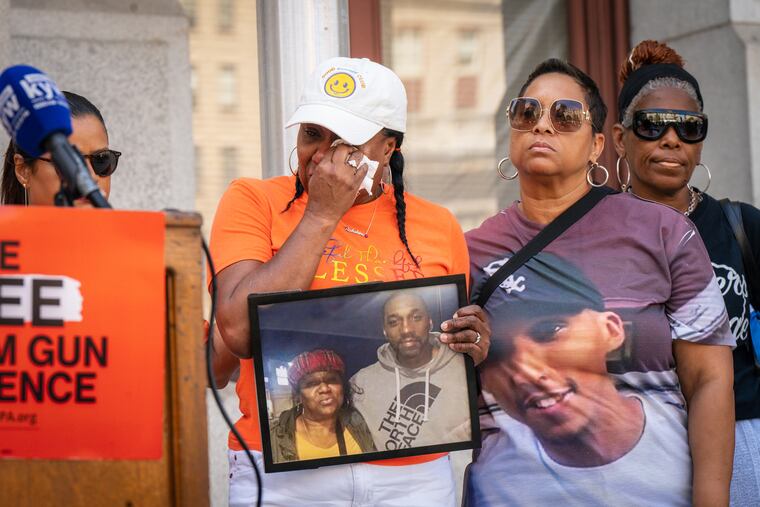Should Philly be able to set its own gun laws? Pa. Supreme Court justices seem skeptical
The six-member panel asked pointed questions of the city's attorneys during a hearing Wednesday, asking why the city was using the courts, and not the legislature, in an attempt address gun laws.

Pennsylvania’s Supreme Court justices on Wednesday questioned whether a lawsuit filed by the city that seeks to allow Philadelphia officials to enact local gun laws was a matter that the court should consider at all — or if it was a policy debate more properly suited for the state legislature.
During a two-hour hearing inside a City Hall courtroom, the six-member panel seemed to reserve its most pointed questions for the city’s attorneys, repeatedly asking how and why the issues raised in the city’s suit should be decided by judges instead of state lawmakers who are elected to debate issues and craft laws.
“To me, it seems the remedy is through voting,” Chief Justice Debra Todd said at one point.
Justice David N. Wecht questioned whether the city was improperly using the courts as a “backstop,” filing a lawsuit in an attempt to get the courts to help the city enact policies that the state legislature has not approved.
At the core of the suit is a legal concept known as preemption, which bans municipalities from passing gun-control measures that are stricter than state gun laws.
The city sued the state in 2020 in an attempt to overturn preemption, arguing that it violated residents’ rights by prohibiting municipal governments from passing local laws intended to save lives. City officials said that if allowed, they would enact and enforce new statutes intended to make it harder for people to obtain weapons for criminal use — requiring a permit to purchase guns in the city, for example, or limiting the number of guns a person can buy in the city within 30 days.
Jasmeet Ahuja, the lawyer who argued on behalf of the city Wednesday, said the consequences of preemption were “unconscionable and unconstitutional,” particularly as gun violence has surged to record heights in recent years. The lack of regulations of firearms, she said, was causing gunfire and denying many city residents — particularly Black and Hispanic people in poor neighborhoods — the right to life and liberty guaranteed by the Pennsylvania Constitution.
But the justices repeatedly questioned the legal soundness of that argument, pushing Ahuja to explain how and why the legislature’s approval and defense of preemption was an issue that necessitated judicial review.
“Your whole argument is built around emotional rhetoric,” said Justice P. Kevin Brobson.
Wecht questioned if the courts might set an unwelcome precedent by intervening on this issue, asking Ahuja if it might cause people concerned about other social problems — such as hunger or addiction — to file similar suits.
Attorneys for the legislature and the state contended that preemption is an issue that should be addressed by lawmakers.
“The remedy is with the legislative process,” said Anthony R. Holtzman, representing Senate President Pro Tempore Kim Ward (R., Westmoreland).
Stanley Crawford, a plaintiff in the case whose son William was killed in 2018, said he left the hearing somewhat pessimistic.
He said it was “insensitive” for some justices to say the case was built on emotion, and he pointed out that Philadelphia residents affected by gun violence can’t singlehandedly swing the makeup of the state legislature, which has traditionally leaned Republican and includes lawmakers from other jurisdictions who are less inclined to approve of gun control.
Mayor Jim Kenney, speaking at a news conference after the hearing, said it “doesn’t make any sense” that the city has repeatedly been stymied when seeking to enact local firearm laws, such as last fall, when a Common Pleas Court judge blocked Kenney’s executive order that aimed to ban guns from recreation centers and playgrounds.
“It’s hurtful and it’s stressful for everybody,” said a visibly frustrated Kenney. “Just give us a chance to mold our own future.”
The justices gave no indication when they might issue a ruling in the case. The city’s lawyers have asked that the suit be allowed to proceed to trial.